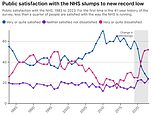Public satisfaction with the NHS has fallen to the lowest level on record amid poor access to GPs and long waits for hospital care.
Less than one in four (24 per cent) people were happy with the health service in 2023, down five percentage points from the previous year.
It is the lowest level since records began in 1983, according to the latest findings from the British Social Attitudes Survey.
The study, of 3,374 people in England, Wales and Scotland, is considered the standard test of how people feel about the NHS.
It reveals that more than half (52 per cent) are now dissatisfied with the NHS, the highest proportion since the survey began.
Your browser does not support iframes.
Your browser does not support iframes.
The main reasons for dissatisfaction are waiting times for GP and hospital appointments (71 per cent), followed by staff shortages (54 per cent) and the fact that the Government is not spending enough money in the NHS (47 per cent), despite record investment.
Health think tanks said there had been an “unprecedented downward spiral” in public satisfaction in recent years and warned political leaders they should take note of the “depressing” results ahead of the general election.
Satisfaction with the NHS peaked in 2010, when 70 per cent of people were happy with the health service, but has since declined.
It has suffered a particularly rapid drop of 29 percentage points since 2020, when services were paralyzed by the Covid-19 pandemic.
Strikes by nurses, doctors and consultants have also led to the widespread cancellation of operations and appointments over the past year.
Only one in three (34 per cent) people were satisfied with GP services in 2023, the lowest level since the survey began. About 41 percent were dissatisfied.
Since 2019, satisfaction with GP services has fallen by 34 percentage points, with many patients now facing a fight for 8am appointments and a battle to see a GP face-to-face. expensive.
There were also problems with dentistry, with a record low satisfaction level of 24 percent and a record dissatisfaction level of 48 percent.
This comes as Britons struggle to find an NHS dentist who is open to new patients in some areas, and people are forced to extract their teeth at home.
Satisfaction with both inpatient and outpatient hospital services remains at record levels.
However, support for the founding principles of the NHS remains high: 91 per cent believe the NHS should be free when people need to use it, 82 per cent agree it should be funded primarily through taxes and the 82 per cent say the NHS should be available to everyone.
The King’s Fund and the Nuffield Trust are sponsoring the health and care questions in the survey, carried out by the National Center for Social Research (NatCen).
Its analysis report said: ‘A decade of limited funding and chronic workforce shortages followed by a global pandemic has left the NHS in a continuing state of crisis.
“Changing the NHS model is not something the public wants; they just want the model they have to work.”
Dan Wellings, senior fellow at the King’s Fund, said: “The results are grim but should not be surprising after a year of strikes, scandals and long waits for care.”
He added: ‘With the health service increasingly unable to meet the expectations and needs of those who depend on it, public satisfaction with the NHS is now in uncharted territory.
“Ahead of the next general election, political leaders should take note of the extent to which satisfaction with this celebrated public institution has declined.”
Your browser does not support iframes.
Your browser does not support iframes.
Regarding the government’s priorities and spending on the NHS, 48 per cent of people thought ministers should “raise taxes and spend more on the NHS”, 42 per cent opted to “keep taxes and spend the same”, and 6 percent chose to “reduce taxes and spend less. in the NHS’.


